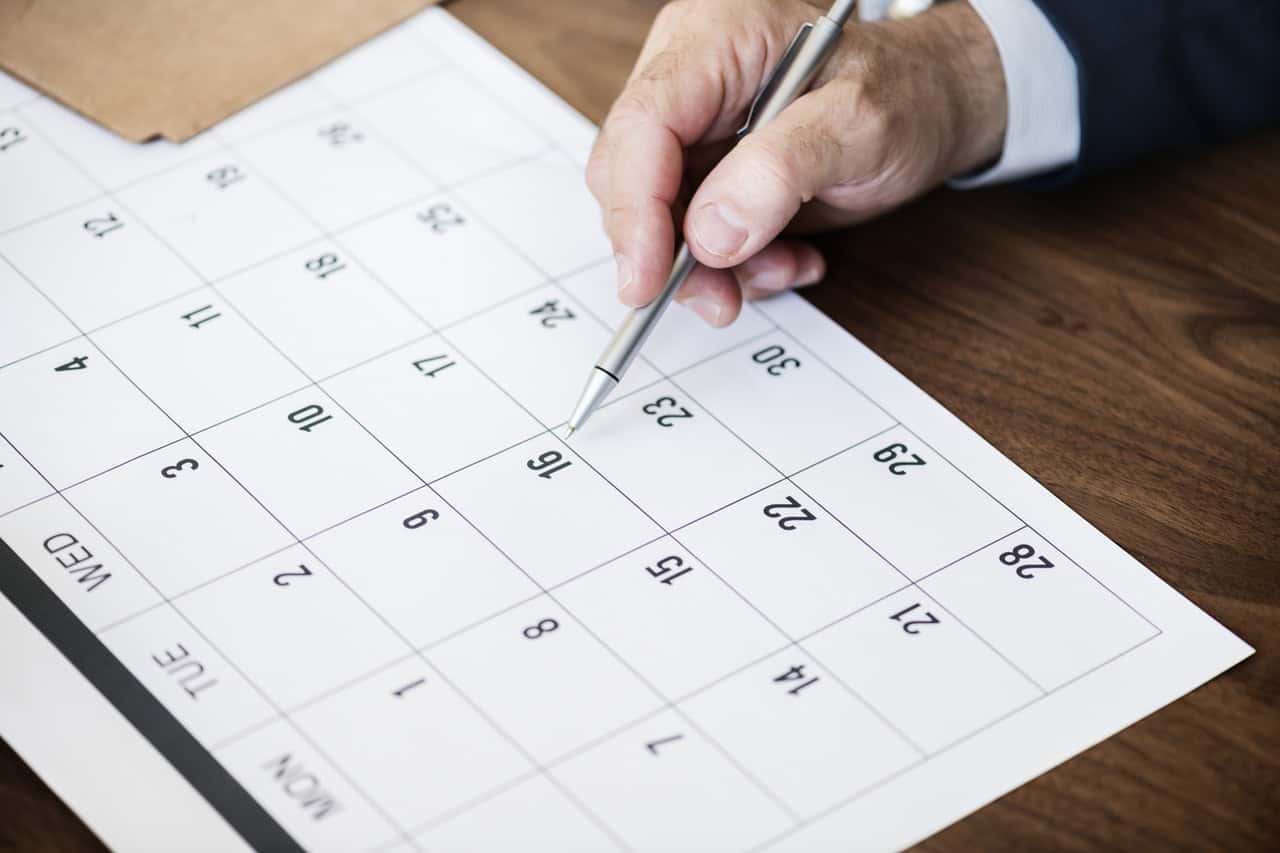If you’re anything like me, you might struggle to revise when preparing for exams. That’s why having a handy revision timetable is so important for those unfortunate procrastinators.
But the real question is, how do you make the perfect revision timetable? Lucky for you, in this article I’ll be taking a look at how to construct the best revision timetable for your exams.
Revision timetables are extremely important to the success of your education (and career). To make the perfect revision timetable, you need to prioritise bad subjects, minimize revision for better ones, add breaks, and stay calm – follow this guide to make the perfect revision timetable.
1. Determine A Starting Date And Day For Your Revision Timetable
 All the best revision timetables have the right starting dates. Unfortunately, the right starting date can be hard to find sometimes.
All the best revision timetables have the right starting dates. Unfortunately, the right starting date can be hard to find sometimes.
Personally, I recommend that you plan to start your revision around 2 months before your first exam. This should allow you enough time to revise, to make sure you cover all necessary content (no matter what exams you’re taking).
You could start earlier, but that might mean that you forget what you revise. This happens to me all the time – I start my revision, and then by the time the exam rolls around, I’ve forgotten what I learnt.
I also suggest starting your revision timetable on a Monday morning. It’s my opinion that the brain takes information in better on Mondays, as it’s a fresh start – and your brain thinks so too…
However, this might not always work for everybody. Everyone is different, and so everybody’s starting date/day will be different.
For the best time to start revising for GCSEs, take a look at this article. It might help you out if you’re unsure of what to do.
Alternatively, if you’re in college studying A-Levels, you might want to take a look at this article. It’s similar to that GCSE article, but is better for college students.
You can change your starting point, but I wouldn’t change it more than a couple of weeks.
Just make sure that you don’t leave it too late. If you’re not careful, you could find that your revision timetable doesn’t give you enough time to revise – and you may fail your exams.
2. Put Your Worst Subjects Into Your Revision Timetable
 Your revision timetable should help you prepare for your exams in a way that is neat and organised. So why would you put subjects you hate into it?
Your revision timetable should help you prepare for your exams in a way that is neat and organised. So why would you put subjects you hate into it?
When you get your GCSE results, you’ll find that having a balanced set of GCSEs is better than having some subjects being amazing and some being… not so amazing.
The same can be said for A-Levels, BTECs, pretty much any exams you take in your life. Employers (and pretty much everyone else) like to see balanced results, as it shows you can work hard at anything.
Therefore, you’ll want to revise the worse subjects more, and the better subjects less. Putting in the worse subjects into your revision timetable first, and giving them the most hours, will help you do this.
If you’re interested about how much employers actually care about either your GCSE or A-Level results, you should check out some of the articles below:
You may want to add some time on to your revision timetable to account for the work you’ll have to do for your worst subjects. Adding on some time means that you’ll not only have time to improve on your bad subjects, but you’ll be able to work on the better ones too.
Some of you might already be in the position that all your subjects are equally as good. If that’s the case, then skip straight to the next subheading.
On the other hand, you might be in the position where all of your subjects are equally as bad. If that sounds like you, it might pay you to take a look at this article for if you fail all your GCSEs.
3. Put The Rest Of Your Subjects Into Your Revision Timetable
 So, you’ve figured out your strengths and weaknesses, and put the latter of the two on top priority. The question is, what do you do with the rest of them?
So, you’ve figured out your strengths and weaknesses, and put the latter of the two on top priority. The question is, what do you do with the rest of them?
Quite a straightforward answer really – just slot them in where you can. As long as you’re balancing out your subjects and giving more time to the bad ones, you can put them wherever you like.
I’d suggest ranking them in order of importance. The most important ones (your worst ones) you put at the top with the most time, and work out all the rest of them from there.
This is what I did when I made my revision timetable for my exams, and I can tell you from experience that it works a treat.
Hopefully, once you’ve done that, you’ll know how much revision you’ll need to do. The average student does 15-20 hours a week, which turns out to be 3-5 hours a day with weekends off, according to Birmingham City University.
This is a great way to organise your revision timetable, but I’d suggest something a little different. If you’re anything like me, you’ll want to revise every day leading up to your exam.
If that’s the case, you should revise 2-3 hours a day instead – every day. It will still come out to 15-20 hours a week, but you’ll be doing it less at a time and more often.
4. Add Plenty Of Breaks To Your Revision Timetable
 Revision is very important, we know that – no revision = no grades. But what about that other thing, where you take time off?
Revision is very important, we know that – no revision = no grades. But what about that other thing, where you take time off?
If you’re a workaholic like me, the word ‘break’ will sound alien to you. As much as I hate to admit it, breaks are essential for the success of your revision.
Taking a break every once in a while will allow your brain to soak up the information you’ve learnt. If you don’t absorb your revision, it’s effectively useless.
Taking breaks is scientifically proven to increase productivity in students. If you don’t believe me, take a look at this study taken by PsychCentral.
It shows us that taking breaks improves focus and concentration when working on a long task (2-3 hours of revision, for example).
Not only does it help your focus and concentration, but it will help you to relax, too. I always get stressed when I work for too long, and so breaks are of great importance to me.
Staying calm and relaxed will help your motivation, too. Staying motivated means that you’ll be more inclined to stick to your revision timetable, and have a higher chance of success.
I recommend working for 50 minutes to an hour, taking a 20 minute break, and continuing. Following this pattern will ensure you get the best results in whatever exams you’re taking and feel good doing it, too.
5. Add Some Fun Activities To Your Revision Timetable
 Some say that revision is all work and no play. Can that really be true?
Some say that revision is all work and no play. Can that really be true?
The answer is most definitely not. Just like taking breaks, having fun is essential to the success of your revision timetable.
If you don’t add some fun activities into your revision timetable, your motivation will divebomb. I’ve had that happen to me at some very inopportune moments in revision.
I find that a few fun activities every month helps me get through the intense stress of revision timetables.
Not too often, but just enough to keep you sane whilst your revision timetable is in practice. Just remember, you can do all the partying you want after your exams are over.
I’m not talking fun activities like going to France for a week, so don’t let that fool you. I mean like meeting up with your friends every once in a while for a fun night out.
Any fun activities you choose to do must not interfere with your revision timetable. If this happens, you can end up prioritising fun instead of revision.
To help you achieve balance between fun and revision, I’d suggest adding all your subjects in before you add fun activities.
This way, you do what’s necessary before what’s not. I know it might suck, but trust me – you’ll benefit in the long run.
6. Work Out What Kind Of A Learner You Are
 Your revision timetable is great for telling you when to revise and preparing you for your exams, whenever they may be. But, it doesn’t work if you don’t revise effectively.
Your revision timetable is great for telling you when to revise and preparing you for your exams, whenever they may be. But, it doesn’t work if you don’t revise effectively.
If you don’t know what kind of a learner you are, you won’t be able to successfully use your revision timetable.
There are 3 main types of learners: visual, aural, and physical. Everyone should fall into one of these 3 categories, and if not, you may be an alien.
Visual learners are best suited to learning using pictures, images, and colours. If you’re a visual learner, you may want to use flashcards or similar methods to boost your learning.
Aural learners benefit from hearing the facts and figures they need to know. They work best using podcasts, listening to teachers, or watching videos.
Physical learners are better at learning through being hands on. I’m a physical learner, and I prefer to make my own methods to remember things and gain understanding through doing it myself.
If you think you’ve figured out what kind of a learner you are, then great – move straight on to step number 5. If not, you might want to take a look at this website for some help.
However, if you don’t think you fit into any of these categories, don’t worry. If you like revising your own way, then that’s okay – everyone is different, so just do your thing.
7. Figure Out How You’re Going To Revise

You’ve got the times you’re going to revise for your exams, and you know what subjects need some extra time. But, how do you make sure the time you spend revising is effective?
By now you should have figured out what type of learner you are. If you have, that’s great – you know what you need to be doing.
If you haven’t, then that’s fine too – there are loads of universal ways to revise that always help me.
One of my favourite ways to revise is to use flashcards. They’re helpful because they solidify important facts and figures in your head, and are easy to make.
In fact, you don’t even have to make them at all – if you use Quizlet, there are millions of flashcards that have been made by other students for you.
Another great way to revise is use mindmaps. Emptying your brain out onto a piece of paper shows you what your strengths are, and what you need to work on.
If you want a more effortless way of revision, I’d suggest videos or podcasts. They’re an easy way to learn information, it’s like having a mini lesson in your head.
I used to listen to podcasts and watch videos all the time when I revised for my exams, and I did extremely well. (Just my secret tip for success there).
Again, if you don’t like any of these methods of revision, you don’t have to use them. It’s all about personal preference, and whatever works best for you.
If you want an extensive list of the best revision techniques, check out this article.
8. Make Sure You Actually Stick To Your Revision Timetable

Revision timetables are amazing for keeping on top of what you should be doing to prepare for exams. However, they won’t work unless you stick at it.
I get it, it can be hard to find the motivation to study sometimes. In fact, most times. Okay maybe all the time…
But believe me when I say that it’s worth it. Sticking to your revision timetable will ensure the success of your exams, no matter how much you might not want to do it.
And trust me, you want some good exam results. If you want to be employed after education, then qualifications are the way to go.
If you need some motivation to stick to your revision timetable, you could always talk to fellow student, or even your teachers.
Doing this and reminding yourself of that end goal is sure to help you motivate yourself to do revision.
As I’ve already said, taking breaks is sure to help your motivation. Doing something fun every now and again keeps you happy and healthy, two things that are essential for revision.
9. Hopefully… Success!

If you do all of what I’ve said, and stick to the tips I’ve given you, you should end up with some successful results.
Just a warning though – making your revision timetable is the easy part. Adding in all of your subjects and breaks, anybody could do that.
The real challenge is sticking to it. If you can successfully stick to your revision timetable, persevere where many other students have failed, you’ll come out the other end with a great set of results.
And from that point, many new doors are opened. Whether you’re in school, college, or university, after your exams you can go and do lots of new things.
Like get a job, for example. Employers nowadays are looking for more qualifications than ever before, and good ones at that.
Which is why revision timetables are so important to your success. Without a proper revision timetable, you won’t get the proper grades – and you won’t get a proper job.

Thank you so much for your advice. Your advises are really helpful